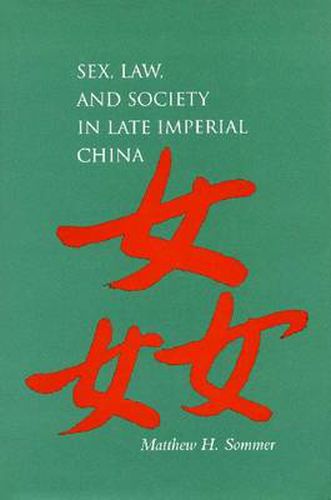Readings Newsletter
Become a Readings Member to make your shopping experience even easier.
Sign in or sign up for free!
You’re not far away from qualifying for FREE standard shipping within Australia
You’ve qualified for FREE standard shipping within Australia
The cart is loading…






This study of the regulation of sexuality in the Qing dynasty explores the social context for sexual behaviour criminalized by the state, arguing that the 18th century in China was a time of profound change in sexual matters. During this period, the basic organizing principle for state regulationof sexuality shifted away from status, under which members of different groups had long been held to distinct standards of familial and sexual morality. In its place a new regime of gender mandated a uniform standard of sexual morality and criminal liability across status boundaries - all people were expected to conform to gender roles defined in terms of marriage. This shift in the regulation of sexuality, manifested in official treatment of charges of adultery,rape, sodomy, widow chastity, and prostitution, represented the imperial state’s efforts to cope with disturbing social and demographic changes. Anachronistic status categories were discarded to accomodate a more fluid social structure, and the state initiated new efforts to enforce rigid gender roles and thus to shore up the peasant family against a swelling underclass of single, rogue males outside the family system. These men were demonized as sexual predators who threatened the chaste wives and daughters (and young sons) of respectable households, and a flood of new leglisation targeted them for suppression.
$9.00 standard shipping within Australia
FREE standard shipping within Australia for orders over $100.00
Express & International shipping calculated at checkout
This study of the regulation of sexuality in the Qing dynasty explores the social context for sexual behaviour criminalized by the state, arguing that the 18th century in China was a time of profound change in sexual matters. During this period, the basic organizing principle for state regulationof sexuality shifted away from status, under which members of different groups had long been held to distinct standards of familial and sexual morality. In its place a new regime of gender mandated a uniform standard of sexual morality and criminal liability across status boundaries - all people were expected to conform to gender roles defined in terms of marriage. This shift in the regulation of sexuality, manifested in official treatment of charges of adultery,rape, sodomy, widow chastity, and prostitution, represented the imperial state’s efforts to cope with disturbing social and demographic changes. Anachronistic status categories were discarded to accomodate a more fluid social structure, and the state initiated new efforts to enforce rigid gender roles and thus to shore up the peasant family against a swelling underclass of single, rogue males outside the family system. These men were demonized as sexual predators who threatened the chaste wives and daughters (and young sons) of respectable households, and a flood of new leglisation targeted them for suppression.